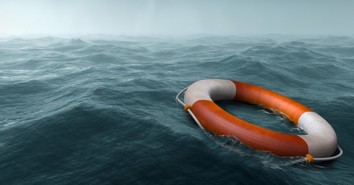Is the Threat of Nuclear War 'at Least Equal Magnitude' to the Cuban Missile Crisis?
In 2018, a pro-Kremlin journalist asked Russian President Vladimir Putin in what scenario Russia would use nuclear weapons. He replied: “If someone decides to destroy Russia, then we have a legal right to respond.” He admitted that “for humanity it will be a global catastrophe” but added perilously: “Still, as a citizen of Russia and the head of the Russian state, then I want to ask myself the question: ‘Why do we need such a world if there is no Russia there?’”
Putin claimed that Russia would launch a nuclear weapon only if it detected the launch of missiles headed for Russia, but he did not clarify if Russia would respond only in the case of nuclear warheads or non-nuclear missiles in general.
Fast-forward to the present. Putin signed the final papers yesterday to illegally annex four regions of eastern Ukraine as Russian territory. Ukraine is continuing its offensive in some of these areas, forcing widespread Russian retreats. Ukrainian guided missiles supplied by the US and the UK have been instrumental in changing the course of the war against Russia.
Will Putin now see such missile strikes against his forces in annexed Ukrainian regions as missile launches against Russia?
A Cold War historian explains the current crisis
This scenario is just one reason Cold War historian Michael Dobbs, author of a definitive account of the Cuban Missile Crisis, is warning that the conflict in Ukraine “presents perils of at least equal magnitude” to that confrontation.
There are other reasons for grave concern as well: Dobbs points to the possibility that “a stray shell from either side could cause an accident at a nuclear power plant, spewing radioactive fallout over much of Europe.” Russia could bungle an attempt to interdict Western military supplies to Ukraine, slipping over into NATO countries like Poland and triggering an automatic US response. Or a Russian decision to use tactical nuclear weapons against Ukrainian troops could escalate into a full nuclear exchange with the West.
Dobbs adds that in 1962, US President John Kennedy and his Kremlin counterpart Nikita Khrushchev possessed “an intuitive understanding of the peril confronting not just their own countries but the entire world if the crisis was allowed to escalate.” This was because both had experienced the horrors of World War II and knew nuclear war would be many times more destructive.
In light of Putin’s question, “Why do we need such a world if there is no Russia there?” we are left to wonder if he shares their understanding of the peril facing the globe today.
A new "Scooby-Doo" movie character is a lesbian
In other news, a new “Scooby-Doo” movie portrays the lead character as a lesbian. A senior member of the British parliament says the Church of England must embrace same-sex marriage or face mounting pressure from the government.
Samford University, a Baptist school in Alabama, is facing protests and criticism for affirming its commitment to biblical sexuality and marriage. And a New York trial judge has ruled that polyamorous relationships are entitled to the same legal protections given to two-person relationships.
Here’s what these stories have in common with Vladimir Putin’s Russia-centric nuclear threat: they each illustrate the conviction that I have a right to what I want, no matter the consequences for those who disagree.
In this view, if Russia believes its territory (legitimate or not) is under attack, it can respond however it chooses. LGBTQ ideology must be embraced by every segment of society even at the cost of First Amendment religious freedoms. If you disagree, you are dangerous to society and undeserving of legal or cultural protections.
Unfortunately, this is familiar ground, a growing attack on conservative Christians I have documented often in the past (for a larger discussion in historical and biblical context, see my book, The Coming Tsunami). Today, I’d like to make a point on this urgent issue I’ve not made before, one that applies as fully to me as to anyone who opposes my biblical worldview.
"My claim to my right to myself"
For nearly thirty years, I have read Oswald Chambers’ classic, My Utmost for His Highest, as part of my morning devotional time. Yesterday I read again his definition of sin as “my claim to my right to myself.” This time, his explanation struck me as it had not before.
Chambers observed: “The disposition of sin is not immorality and wrong-doing, but the disposition of self-realization—I am my own god. This disposition may work out in decorous morality or in indecorous immorality, but it has the one basis, my claim to my right to myself.”
This claim is at the foundation of everything that is wrong with our culture. But it is prevalent in “moral” people as well, as Chambers notes: “When our Lord faced men with all the forces of evil in them, and men who were clean living and moral and upright, he did not pay any attention to the moral degradation of the one or to the moral attainment of the other; he looked at something we do not see, viz., the disposition.”
In other words, those of us who uphold biblical morality and religious freedom can be as sinful as those who reject it if our motives are “my claim to my right to myself.” This is a binary choice: I can love and serve my Lord and my neighbor (Matthew 22:37-39), or I can love and serve myself. I can make God my god, or I can make myself my god (Genesis 3:5).
But I cannot do both. Neither can you.
A life-changing paragraph
Inside the Bible I used as a pastor, I taped a paragraph where I could see it each Sunday before I preached. Its words from Watchman Nee’s The Normal Christian Life stirred my soul again when I read them today:
“A day must come in our lives, as definite as the day of our conversion, when we give up all right to ourselves and submit to the absolute lordship of Jesus Christ. There must be a day when, without reservation, we surrender everything to him—ourselves, our families, our possessions, our business, and our time. All we are and have becomes his, to be held henceforth entirely at his disposal. From that day we are no longer our own masters, but only stewards.
“Not until the lordship of Jesus Christ is a settled thing in our hearts can the Holy Spirit really operate effectively in us. He cannot direct our lives effectively until all control of them is committed to him. If we do not give him absolute authority in our lives, he can be present, but he cannot be powerful. The power of the Spirit is stayed.”
Will the Spirit be “powerful” or “stayed” in your life today?
Publication date: October 6, 2022
Photo courtesy: ©Getty Images/Victority
Jim Denison, PhD, is a cultural theologian and the founder and CEO of Denison Ministries. Denison Ministries includes DenisonForum.org, First15.org, ChristianParenting.org, and FoundationsWithJanet.org. Jim speaks biblically into significant cultural issues at Denison Forum. He is the chief author of The Daily Article and has written more than 30 books, including The Coming Tsunami, the Biblical Insight to Tough Questions series, and The Fifth Great Awakening.
The views expressed in this commentary do not necessarily reflect those of CrosswalkHeadlines.
For more from the Denison Forum, please visit www.denisonforum.org.
The Daily Article Podcast is Here!







